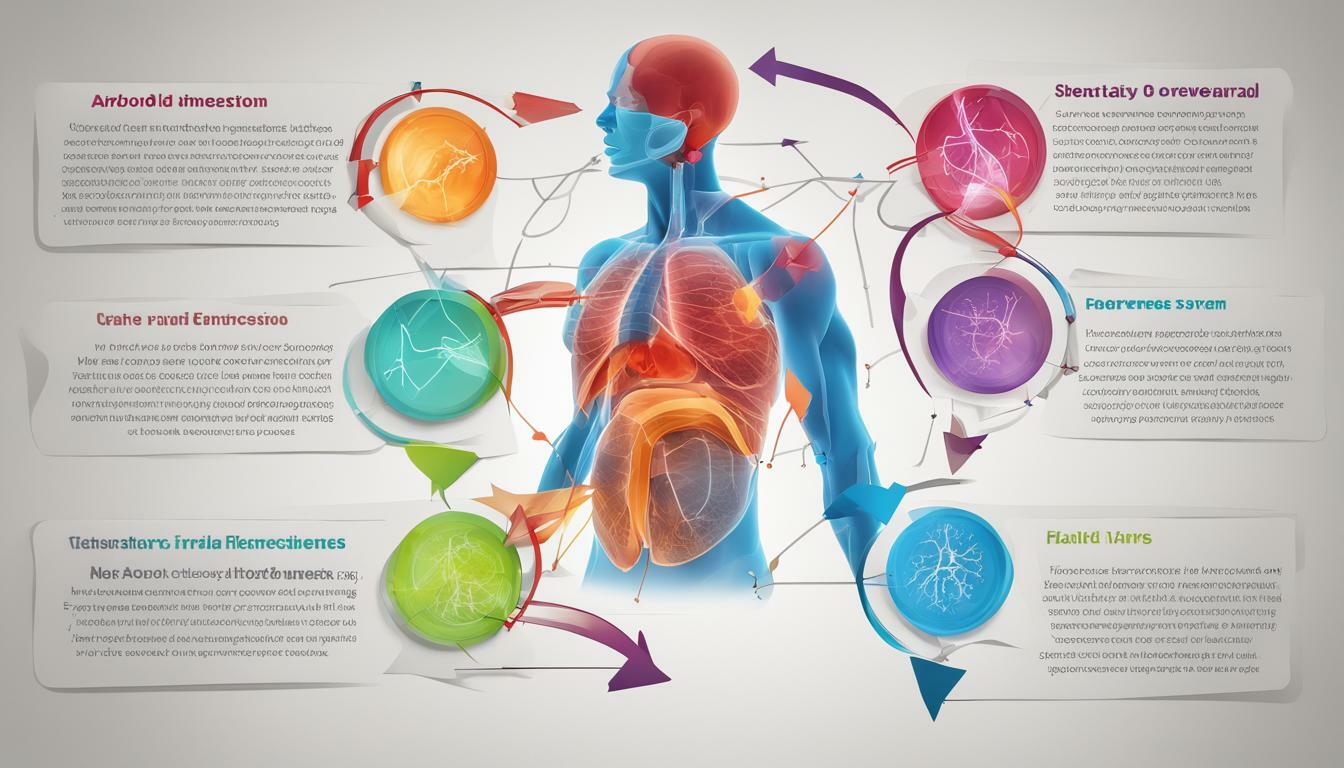Peptides and steroids are often mentioned together in the context of health and fitness. However, are peptides steroids? The answer may surprise you. In this section, we will explore the differences and similarities between these two compounds. By the end, you will have a clearer understanding of peptides and steroids in the context of health and fitness.
Key Takeaways:
- Peptides and steroids are not the same thing.
- Peptides have a different chemical structure and mode of action than steroids.
- Understanding the difference between peptides and steroids is important for making informed decisions about their use.
Peptides vs. Steroids: Understanding the Difference
While peptides and steroids share some similarities, they are fundamentally different compounds. Understanding these differences is crucial to grasping the distinction between peptides and steroids.
Peptides are short chains of amino acids (less than 50), while steroids are complex organic compounds with a characteristic four-ring structure. Peptides are naturally occurring molecules in the body and play various roles, such as signaling molecules and hormones. Steroids, on the other hand, can be endogenous (produced by the body) or exogenous (introduced from outside the body). Steroids are often used for their anti-inflammatory and immune-suppressing properties and hormone replacement therapy.
The most significant difference between peptides and steroids is their mode of action. Peptides work by signaling specific cellular responses, while steroids interact with receptors in the body to produce various effects. Steroids usually work by entering a cell and binding to a receptor, where they act to regulate or activate a particular process. Peptides, on the other hand, trigger specific enzymes or cell receptors, starting a signaling cascade that leads to the desired result.
Peptides vs. Steroids: Chemical Structure
The chemical structure of peptides and steroids is the primary reason for their differences in function. Peptides typically consist of a few amino acids chained together, while steroids are complex organic compounds with a characteristic four-ring structure. Peptides can contain various amino acids with differing properties that determine their function, while steroids are defined by their ring structure.
Another significant difference between peptides and steroids is their size. Peptides are relatively small molecules, making them suitable for intracellular signaling, while steroids are generally much larger, limiting their ability to interact with intracellular targets.
Peptides vs. Steroids: Effects on the Body
Peptides and steroids have different effects on the body due to their distinct mechanisms of action. Steroids typically have more powerful and rapid effects on the body due to their ability to interact with intracellular targets directly. As a result, steroids can produce dramatic changes in the body, such as muscle growth, increased energy levels, and enhanced performance.
Peptides, on the other hand, work by signaling specific responses in the body, leading to slower and more gradual results. Peptides can take time to accumulate in the body and produce the desired results. However, they also tend to have fewer side effects and are safer to use than steroids.
“Peptides and steroids have different effects on the body due to their distinct mechanisms of action.”
In conclusion, peptides and steroids are fundamentally different compounds with unique mechanisms of action and effects on the body. Understanding the differences between these compounds is crucial to making informed decisions about their use in health and fitness. By taking the time to understand the properties of peptides and steroids, individuals can make informed decisions about how to best utilize these compounds for their specific needs.
Peptide Hormones vs. Steroids: Function and Effectiveness
Peptides and steroids have distinct differences in their chemical structures, functions, and effects on the body. Peptide hormones, for instance, are small protein molecules that act as signaling agents between cells, tissues, and organs. Steroids, on the other hand, are synthetic or naturally occurring compounds that mimic the effects of the male sex hormone testosterone.
Peptide therapy involves the use of peptides to elicit a specific response in the body, such as promoting healing, boosting energy, or increasing muscle mass. Peptide therapy is a relatively new and rapidly evolving field with significant therapeutic potential.
One of the main advantages of using peptides over steroids is the reduced risk of side effects. Steroids can cause serious complications, such as liver damage, heart disease, and hormonal imbalances. Peptides, in contrast, have a low risk of adverse effects and are generally well-tolerated by the body.
Peptide hormones have a wide range of therapeutic applications, from treating growth hormone deficiencies to promoting skin health. Some of the key benefits of peptide therapy include increased muscle mass, reduced inflammation, improved insulin sensitivity, and enhanced immune function.
For example, growth hormone-releasing peptides (GHRPs) are a class of peptides that stimulate the release of growth hormone from the pituitary gland. They have been shown to increase muscle mass and strength, improve bone density, and promote fat loss. Another example is insulin-like growth factor 1 (IGF-1), which is produced in the liver in response to growth hormone stimulation. IGF-1 has been shown to have anti-aging effects, improve cognitive function, and enhance muscle repair and recovery.
In contrast, steroids are typically used to increase muscle mass and improve athletic performance. However, their use is associated with a range of side effects, including acne, hair loss, and mood swings. Long-term use of steroids can also lead to serious health complications, such as kidney and liver damage.
Overall, while both peptides and steroids have their applications, peptides offer a safer and more targeted approach to therapy with fewer side effects. With ongoing research and development, peptide therapy is likely to become a more widely used and effective tool for promoting health and well-being.
Peptides and Bodybuilding: Muscle Growth and Performance
Peptides have garnered attention in the bodybuilding community for their potential to enhance muscle growth and performance. Unlike steroids, peptides do not have the same negative side effects or legal restrictions, making them a popular and legal alternative.
Peptides work by increasing the production of human growth hormone (HGH) and insulin-like growth factor 1 (IGF-1). These hormones play a crucial role in muscle growth, repair, and recovery, making them essential for bodybuilding. Peptides such as Ipamorelin, GHRP-2, and CJC-1295 are popular among bodybuilders due to their ability to stimulate the release of HGH and IGF-1.
| Peptide Name | Benefits |
|---|---|
| Ipamorelin | Increases muscle growth, fat loss, and energy levels |
| GHRP-2 | Stimulates the release of HGH and enhances muscle growth and recovery |
| CJC-1295 | Increases HGH and IGF-1 levels for muscle growth and improved recovery |
Peptides can also aid in fat loss and improve overall physical performance. They enhance endurance, strength, and agility, making them a valuable addition to any fitness routine. Additionally, peptides can help to reduce inflammation and promote healing, further enhancing the recovery process.
It is important to note that peptides alone do not guarantee muscle growth and performance enhancement. To see the best results, bodybuilders must combine peptide use with a proper diet and exercise routine. Peptides can aid in achieving desired results, but they are not a substitute for hard work and dedication.
Overall, peptides provide a legal and effective alternative to steroids for bodybuilders. With their ability to enhance muscle growth, improve performance, and aid in recovery, peptides have become a valuable tool in the fitness industry.
Peptide Supplements: Enhancing Health and Well-being
Peptide supplements are gaining popularity in Australia for their potential benefits beyond muscle growth and performance enhancement. These supplements offer a range of health and wellness benefits that can support individuals’ overall well-being.
One of the most popular peptide supplements is collagen peptides. Collagen is a protein that plays a crucial role in maintaining skin health, joint health, and overall body structure. As we age, our bodies produce less collagen, which can lead to wrinkles, joint pain, and other age-related issues. Collagen peptide supplements can help replenish this essential protein, leading to improved skin elasticity, joint mobility, and overall vitality.
Another peptide supplement gaining traction is thymosin alpha-1. This peptide has been shown to boost immune function, making it an attractive option for those looking to support their immune system. Thymosin alpha-1 has also been studied for its potential to treat chronic viral infections, making it a promising option for those with conditions such as hepatitis B and C.
Other peptide supplements, such as creatine peptides, offer potential benefits for athletic performance and cognitive function. Creatine peptides have been shown to improve endurance and muscle strength, making them a popular option for athletes and bodybuilders. Additionally, certain peptide supplements may support cognitive function, memory, and focus.
It is important to note that while peptide supplements offer many potential benefits, they should be used in consultation with a healthcare professional. As with any supplement, it is crucial to understand the potential interactions and side effects before incorporating them into your routine. By doing so, individuals can make informed decisions about their health and wellness.
Exploring Peptide Therapy and Applications
Peptide therapy refers to the administration of bioactive peptides to treat various medical conditions and enhance bodily functions. Compared to traditional drugs, peptides offer several advantages, including higher specificity, lower toxicity, and reduced side effects. Peptide therapy thus represents a promising area of research for developing novel treatments.
One of the key benefits of peptide therapy is its potential for treating obesity and related metabolic disorders. Many peptides have been identified for their ability to regulate appetite, fat metabolism, and insulin sensitivity, all of which play crucial roles in obesity. For instance, adiponectin, a peptide hormone secreted by fat cells, has been found to improve insulin sensitivity and reduce inflammation in obese individuals. Other peptides, such as glucagon-like peptide-1 (GLP-1) and peptide YY (PYY), have been shown to reduce food intake and increase satiety in clinical trials.
Peptide therapy also offers potential benefits for individuals with diabetes, a chronic metabolic condition characterized by high blood sugar levels. Some peptides, such as glucagon, amylin, and GLP-1, can stimulate insulin secretion and improve glucose metabolism in diabetic patients. Additionally, several peptides are being investigated for their potential to protect against diabetic complications, such as neuropathy and nephropathy.
Beyond metabolic disorders, peptide therapy has shown promise in treating hormone imbalances, autoimmune diseases, and neurological conditions. For example, growth hormone-releasing peptides (GHRPs) have been used to enhance growth hormone secretion and reverse the effects of age-related decline in muscle mass and bone density. Peptides such as thymosin alpha-1 have been shown to boost immune function and improve outcomes in patients with autoimmune diseases like lupus. In the field of neurology, certain peptides are being explored as potential treatments for Alzheimer’s disease, Parkinson’s disease, and traumatic brain injury.
Overall, peptide therapy represents a rapidly growing field with numerous potential applications. As more research is conducted, it is likely that new peptides will be identified with novel functions and therapeutic effects. By harnessing the power of these bioactive molecules, it may be possible to develop new treatments for a wide range of medical conditions.
Peptide therapy offers several advantages over traditional drugs, including higher specificity, lower toxicity, and reduced side effects, making it a promising area of research for developing novel treatments. Peptides may be particularly useful in treating conditions like obesity, diabetes, hormone imbalances, autoimmune diseases, and neurological disorders. By understanding the potential benefits of peptide therapy, individuals in Australia can make informed decisions about incorporating this approach into their healthcare regimes.
The Distinction Between Peptides and Steroids in Health and Fitness
After exploring the definitions, differences, and similarities between peptides and steroids, it is clear that they are not the same thing. While both have uses in health and fitness, they are distinct compounds with unique properties.
Peptides are short chains of amino acids that play various roles in the body, such as signaling cells and facilitating cell growth. In contrast, steroids are hormones that have anti-inflammatory and muscle-building effects. It is important to note that not all steroids are illegal or harmful, as some are produced naturally in the body or used for medical purposes.
One of the most significant differences between peptides and steroids is their potential side effects. Steroids can cause a range of adverse effects, such as mood changes, acne, hair loss, and liver damage. Peptides, on the other hand, are generally considered safe with few side effects when used properly.
Peptide Therapy
One area in which peptides have shown promise is in the realm of peptide therapy. Peptide therapy involves the use of specific peptide sequences to treat various health conditions, such as obesity, diabetes, and hormone imbalances.
Peptides can also have significant benefits for athletes and bodybuilders seeking to enhance their performance and muscle growth. Unlike steroids, peptides do not cause the same level of muscle gains, but they can offer more sustainable results with fewer side effects.
The Benefits of Peptide Supplements
Peptide supplements are another way individuals can incorporate peptides into their health and wellness routines. Peptide supplements may offer benefits such as improved skin health, immune support, and cognitive function.
It is essential to note that peptide supplements should be used responsibly, and individuals should always consult with a medical professional before incorporating them into their routines.
In conclusion, while peptides and steroids share some similarities, they are not the same thing. Understanding the differences between these compounds is crucial for making informed decisions about their use in health and fitness. Peptides offer unique benefits with fewer side effects compared to steroids, making them an attractive option for athletes, bodybuilders, and individuals seeking optimal health and wellness.




